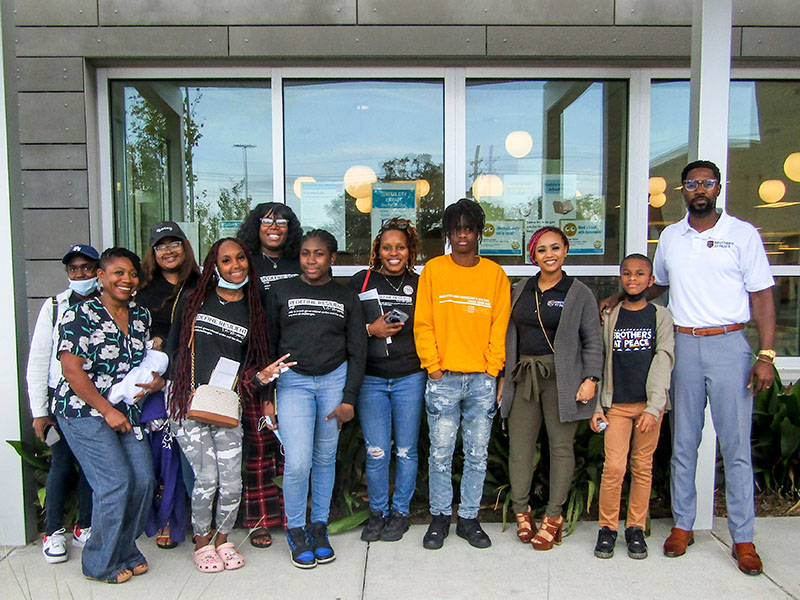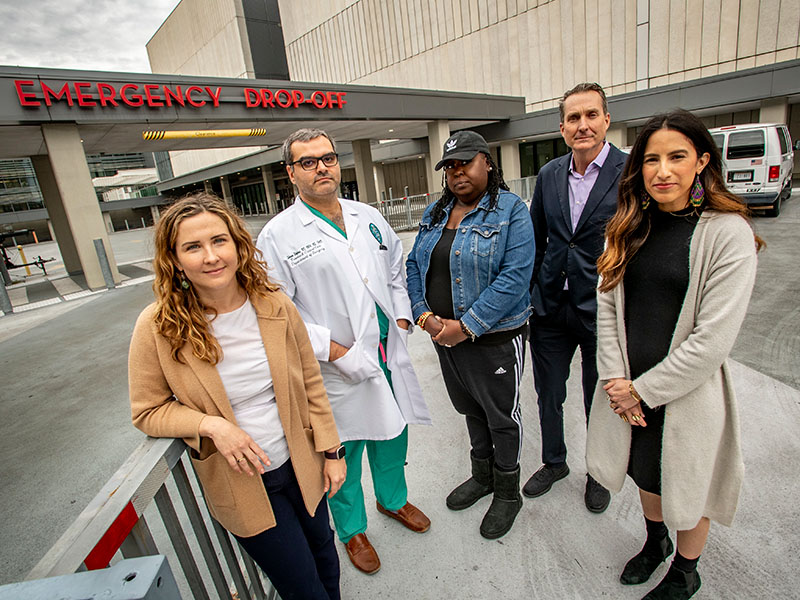Tulane, community partners launch CDC-funded research hub for youth violence prevention

The Center for Youth Equity involves young people in all aspects and develops a collaborative learning process with organizations, neighborhoods, schools and families. Samantha Francois (second from left), assistant professor of social work, Dominque Jones-Johnson (center), executive director of Daughters Beyond Incarceration, Tasia Taylor (third from the right), project coordinator for Brothers at Peace, and (far right) Ronald Scott, executive director of Brothers at Peace, pictured with youth mentees.
A collaboration between New Orleans area community organizations and Tulane University aims to prevent youth exposure to violence in a way that enlists and centers the voices of young people and communities most affected by it.
The Centers for Disease Control and Prevention has awarded Tulane University a five-year grant to establish the Center for Youth Equity, a hub for youth violence prevention work using a multidisciplinary, culturally responsive approach rooted in equity and community engagement.
“The grant directly involves young people in all aspects of the center and creates a unique collaborative learning process with organizations, neighborhoods, schools and families directed at creating positive and sustainable change,” said co-principal investigator Katherine Theall, PhD, senior director of Tulane’s Violence Prevention Institute (VPI) and professor with the Tulane University School of Public Health and Tropical Medicine.
“Understanding the complexity of each person and their environment, and how the environment influences behavior, is necessary for preventing gun violence."
Tamara Jackson, executive director of Silence is Violence
The New Orleans Center for Youth Equity (CYE) is the first CDC-funded National Center of Excellence in Youth Violence Prevention in the Gulf South and one of only five in the country. The center, which is embedded within the VPI, will strengthen existing programs and create a new network to prevent youth exposure to violence in the Gulf South.
Interdisciplinary researchers from Tulane’s schools of Public Health, Medicine and Social Work are working closely with community partners Brothers at Peace, the City of New Orleans Office of Gun Violence Prevention, Daughters Beyond Incarceration, the Institute of Women and Ethnic Studies, the New Orleans Children and Youth Planning Board, Silence is Violence and the Spirit of Charity Trauma Center at University Medical Center.
The bi-directional academic and community partnership exemplifies the values of the VPI to integrate community organizations in its work as these organizations understand the experiences of those the CYE hopes to reach.
“In the heads of young people, violence prevention is just surviving their neighborhood, their school,” said Dominque Jones-Johnson, founder and executive director of Daughters Beyond Incarceration. “They will want to know that we will be there for them for the whole five years, to see them as human and to grow with them.”
Experiencing or witnessing violence has far-reaching and profound negative consequences, and the CYE hopes that involving young people in prevention approaches will mitigate or eliminate these adverse outcomes.
“Understanding the complexity of each person and their environment, and how the environment influences behavior, is necessary for preventing gun violence. We have to use a holistic approach that involves young people to effectively address this issue,” said Tamara Jackson, executive director of Silence is Violence and assistant director for the city of New Orleans Office of Gun Violence Prevention.
The CYE is framed within anti-racist and anti-oppressive constructs that aim to address the root causes of youth exposure to violence and acknowledge the ways systemic and structural violence manifest as lower socioeconomic opportunities, disinvestment in schools and neighborhoods, and discriminatory law enforcement that overwhelmingly affect Black and African American communities. The CYE will conduct community-driven research and evaluation, translate the latest evidence-based research into policy and practice and lead training and education programs for youth and young adults, families, community organizations, college students and faculty.
The center will oversee two primary research projects: an empowerment project that engages Black and African American youth ages 10 to 17 in youth-led organizing to prevent exposure to neighborhood and police violence; and a hospital trauma center-initiated, community-integrated approach that works with older youth (ages 18 to 26 years old) victims of gun violence to reduce community rates of gun violence.
“Our mission for the research core of the center is to listen and engage with young people of all ages as we develop, implement and evaluate both research projects, and to keep them at the center of what we do and how we do it,” said center Research Core Director Julia Fleckman, PhD, VPI associate director, assistant professor with the School of Public Health and Tropical Medicine, and lead investigator for the hospital-initiated research project.
The center team also hopes to extend what is developed beyond Tulane learners and be accessible to communities.
“The CDC’s intent is to build the evidence base around youth violence prevention. We are dedicated to growing beyond that to speak to a wider audience and understand how we share what we are doing to a policy-based audience, to those doing programming for young people, and to schools,” said the center Outreach and Translation Core Director Samantha Francois, PhD, VPI executive director, assistant professor of social work and lead investigator for the empowerment research project.
Joseph Constans, PhD, clinical professor of psychiatry and behavioral sciences in the School of Medicine and research professor in the School of Public Health and Tropical Medicine, is CYE’s co-principal investigator; co-investigators include VPI Executive Director Stacy Drury, MD, PhD, the Remigio Gonzalez MD Endowed Professor of Child Psychiatry, and Sharven Taghavi, MD, MPH, assistant professor of surgery at the School of Medicine.

From left: Julia Fleckman; assistant professor of public health; Tulane trauma surgeon Dr. Sharven Taghavi; Tamara Jackson, executive director of Silence is Violence; clinical psychologist Joseph Constans; and trauma psychologist Erika Rajo of University Medical Center of New Orleans. The team is leading a community-integrated approach that works with victims of gun violence and hospital trauma staff to reach individuals ages 18 to 24 years old. Photo by Paula Burch Celentano.
